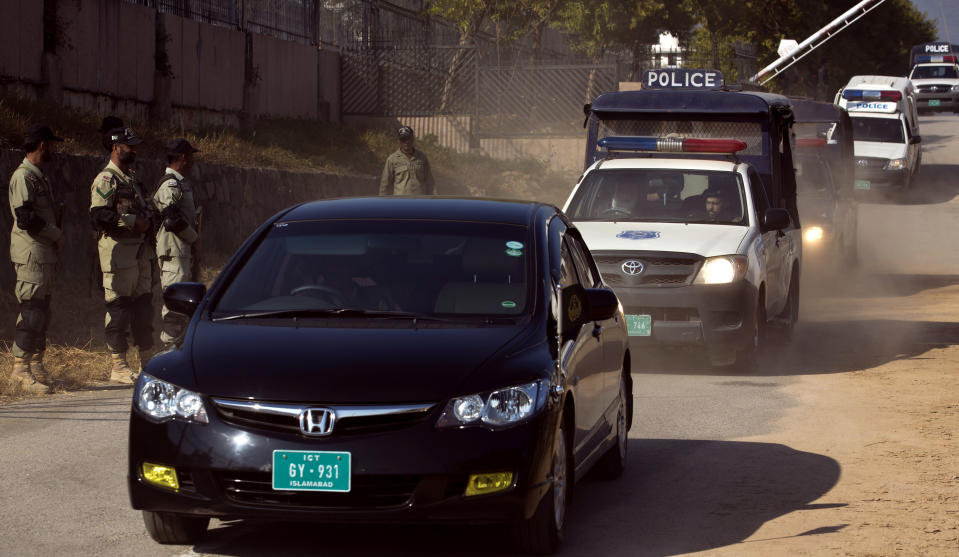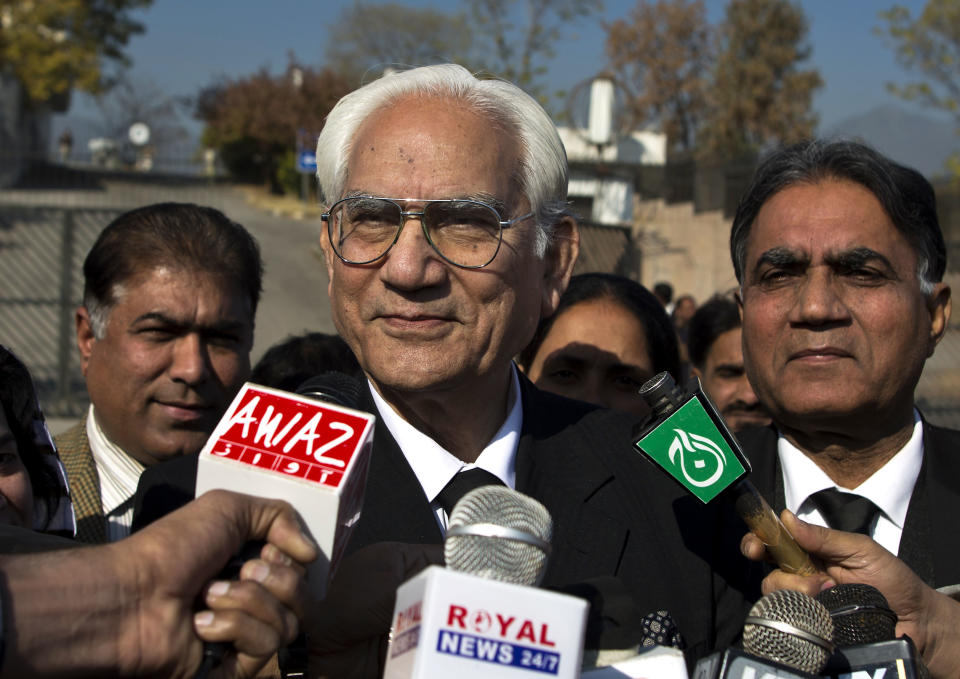Pakistan's Musharraf again a no-show at trial
ISLAMABAD (AP) — It is Pakistan's biggest trial in years: The country's former strongman, a veteran of the powerful military, faces charges of high treason in a case that could result in the death penalty. But so far authorities can't get former President Pervez Musharraf into the courtroom.
Musharraf was on the way to the latest session Thursday when his heavily secured convoy suddenly turned to speed to a military hospital after he suffered a heart problem on route, according to his lawyers and police.
Musharraf did not attend the two previous sessions of his trial last months for security reasons after explosives were found on the route he would take to the courtroom.
His lawyers said Thursday that the 70-year-old general was not well and was in intensive care. But the latest detour raised skepticism among some Pakistanis, believing that he was avoiding the embarrassment of appearing in a civilian courtroom — a reflection of the public perception that the military, a powerful force in Pakistan's politics, is above the law.
The trial is an unprecedented prosecution of a top military figure — and a stark fall from grace for Musharraf, the former army chief who came to power in a 1999 coup and ruled Pakistan for nearly a decade. In self-imposed exile since he was forced from power in 2008, he returned in March intending to run in parliamentary elections. Instead, he has been hit by a barrage of legal cases relating to his time in office, resulting in him being barred from entering elections.
The high treason case is the most serious and could result in the death penalty if he's convicted. The charges are connected to his decision in 2007 to declare a state of emergency and detain senior judges including the chief justice. Critics said he was worried the judges would challenge his recent re-election as president but Musharraf portrayed it as a necessary step to fight the growing Taliban insurgency.
Thursday's session of his trial was the third since it began Dec. 24, and Musharraf —who is residing at his farmhouse in the Islamabad suburbs — has not shown up for any. On Wednesday, he did not appear because of the bomb discovery, and one of his lawyers told the judges that if anything happened to Musharraf, the court would be held responsible.
But the judge ordered Musharraf to appear on Thursday, threatening to issue an arrest warrant against him if he failed to — setting up a potential showdown with the man who was once the most powerful person in the country.
Musharraf's convoy was on the way to court, set up in the National Library building, when it made the unexpected rush to the Armed Forces Institute of Cardiology in the nearby city of Rawalpindi. A police official, Deputy Inspector Jan Mohammed, told the court that Musharraf fell ill.
The judge exempted Musharraf from Thursday's proceedings because of his health issues and adjourned the case till Monday.
One of Musharraf's lawyers, Khalid Ranjha, said he had developed a "heart problem," while another lawyer, Mohammed Ali Saif, said Musharraf was "not well."
"Doctors are doing medical tests on him. His condition is not better, and according to our information he is being kept at the intensive care unit," said Saif.
An active swimmer and former army commando, Musharraf is not publicly known to have had any heart issues. Doctors at the hospital could not be reached for comment.
The timing of the heart problem immediately sparked accusations that Musharraf was ducking his trial.
The prosecutor in the case, Akram Sheikh, said after Musharraf's non-appearance Thursday that "different tactics" are being used by the defense.
On the streets of Islamabad one resident was more blunt.
"Why a bomb is found at every hearing?" said Aashiq Chohan. "When a bomb was not found, he fell sick. It all is aimed at escaping the court cases."
Omar R. Quraishi, the editorial pages editor at Pakistan's English-language Express Tribune newspaper said many people are skeptical.
"Public perception is that in Pakistan normally generals, military people, don't want to appear in court, in a civilian court because they feel that the military's power will be somehow diminished," he said.
Musharraf's legal team as well as the general himself have repeatedly pointed out that Musharraf returned to Pakistan voluntarily, knowing full well that he might face legal as well as security problems. In a statement Thursday they emphasized that Musharraf believes in the "supremacy of the rule of law."
He has faced security threats since his return. Even before he stepped off the plane, the Pakistani Taliban threatened to kill him. Militants in Pakistan revile Musharraf for his support of the U.S-led war in Afghanistan and his decision to raid a mosque in Islamabad in 2007 that ended in a bloody confrontation with mosque supporters.
Musharraf and his legal team have portrayed the cases against him as a vendetta by the prime minister Musharraf ousted in the coup — Nawaz Sharif, who is back in office — and the former chief justice who was detained under Musharraf. They say the judicial system is biased against him and that they don't trust the authorities to protect him.
When asked whether Musharraf was using a medical scare to avoid embarrassment in the courtroom, a lawyer for Musharraf said the former commando was afraid of nothing.
"He is not the type of person who is afraid of anything," said Ahmed Qasuri.






